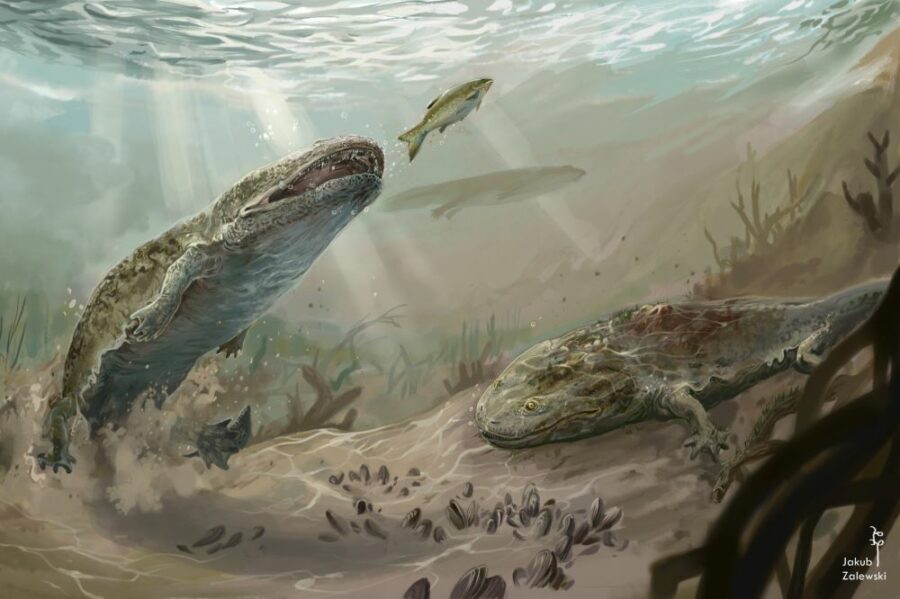| Weronika Cygan |
Fossils of extinct organisms provide us with information about how ecosystems looked millions of years ago. However, they might also be a source of information about ourselves and shed light on diseases that plague contemporary humans.
The remains of prehistoric animals found by archaeologists are gold mines of information. Modern technologies enable scientists to find data that several years ago were beyond their reach. Nowadays, we are able to determine how dinosaurs moved, the colours of the plumage of the first bird ancestors or learn about what was the exact last meal of a dead triceratops.
Metoposaurus, representatives of Labyrinthodontia (Greek, ‘maze-toothed’) in their habitat, about 210 million years ago. The individual on the right has a distinct overgrowth in the anterior thoracic spine. It has limited mobility along with the ability to hunt and seems malnourished. Author of the picture: Jakub Zalewski. Source: ‘An insight into cancer…’, Licence: CC BY 4.0
More and more often researchers of extinct vertebrates discover fossils with traces of afflictions contemporary medicine tries to tackle. One such is tumours taking their toll on the former inhabitants of our planet and currently the main civilisational challenge haunting the society of the 21st century.
Pathological and uncontrolled growth of tissue causes tumours and overgrowths to form in the body of the afflicted, traces of which are sometimes found in the remains of prehistoric animals. Dawid Surmik, PhD, from the USil Faculty of Natural Sciences, the guest of the next Scientific Premiere Stage led the works of a team of scientists researching a Triassic vertebra of an extinct temnospondyl amphibian, Metoposaurus krasiejowensis, discovered in Krasiejów near Opole, southwestern Poland. In the paper published at the end of 2022 in ‘BMC Ecology and Evolution’, the team of scientists concluded that cancer that affected the fossil amphibian was osteosarcoma. This cancer also affects humans, therefore the possibility of scrutinising and inspecting an extinct animal suffering from it is an opportunity to better understand the nature of the disease and—indirectly—to search for effective solutions for today’s human and animal oncology.
During the Scientific Premieres Stage, on Thursday, 16 February 2023 at 6 p.m., Dawid Surmik, PhD will talk about what prehistory can teach us about the present and why we should carefully study extinct species. The meeting dedicated to interdisciplinary research, palaeontology and dinosaurs will be hosted by Jarosław Juszkiewicz.
The event will be translated into Polish sign language.
Previous meetings are available on the University’s YouTube Channel.







